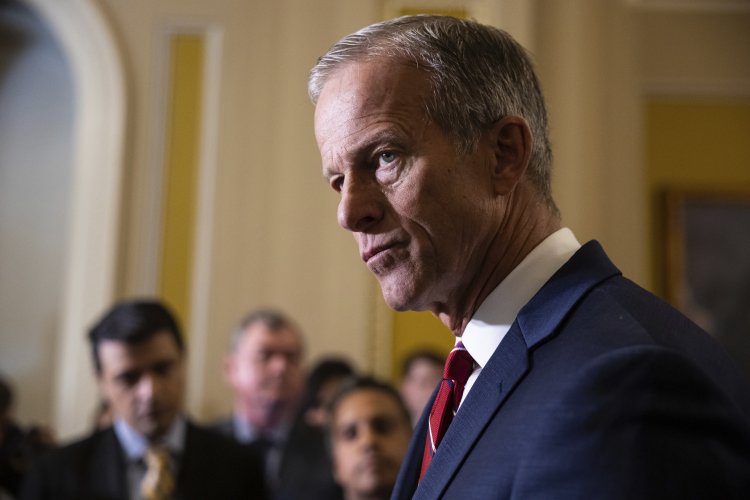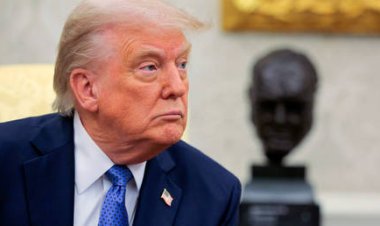Why Mike Johnson and John Thune Continue to Support Trump During Tariff Turmoil
The leading figures in Congress are closely aligned with the president, while their members express both public and private concerns.

Just two days into Trump’s unexpected trade conflict, Speaker Mike Johnson and Senate Majority Leader John Thune have shown no inclination to urge a change in direction, even in the face of a 10 percent downturn in the stock market and cautionary messages from Federal Reserve Chair Jerome Powell.
Rather, the two leaders believe it's important to give the Trump administration time to stabilize the economy. This stance persists despite their own pro-free trade beliefs and the apprehension expressed by some GOP members in private conversations.
Thune has long shared concerns about tariffs and their negative repercussions for his home state, South Dakota. On Friday, he attended a lunch where members discussed their “hopes, dreams and nightmares” regarding Trump’s trade policy, as noted by North Dakota Senator Kevin Cramer.
Yet, Thune and Johnson are confronted with a harsh political reality: they require Trump and lawmakers aligned with him to advance the GOP legislative agenda, making it politically risky to distance themselves from him.
“If Republican members start drifting away from supporting President Trump, everybody gets weaker,” Cramer asserted, cautioning that any withdrawal of support could complicate their relationship with the president.
On Tuesday, Thune argued against a Democratic effort to reverse Trump’s tariffs on Canada, which he maintained were justified by the drug trafficking issues mentioned by Trump. However, four Republicans, including Mitch McConnell, Thune’s predecessor as GOP leader, chose to break ranks.
Amid the market turmoil that escalated on Friday, Thune acknowledged his own negativity regarding tariffs but expressed hope that Trump’s “attempt at reciprocity” would yield a “good outcome.”
“We’re all watching carefully, and obviously he’s got a plan,” Thune told reporters. “And hopefully it's one that you’ll start seeing some results from fairly quickly and I hope it yields some positive results.”
Johnson faces a pressing need to rally support from Trump, who he requires to mitigate internal disputes within the party. Presently, Johnson is engaged in a contentious debate regarding a proposal to prohibit proxy voting for new parents. This internal conflict has stalled House proceedings, and Johnson is seeking Trump’s assistance to navigate the situation.
In addition, Johnson will need Trump’s influence to persuade conservative hard-liners as he works to finalize a budget proposal next week. GOP leaders aspire to bring a revised Senate budget resolution to the House floor on Wednesday or Thursday, but success hinges on Trump convincing a cohort of skeptical fiscal conservatives to support the plan.
With these challenges on his plate, Johnson, who confidently predicted in February that Trump would not impose blanket tariffs, has largely ignored the significant market impact of the newly enacted tariffs.
“It may be rocky in the beginning, but I think that this will make sense for Americans,” Johnson stated ahead of the tariff implementation. He posted a supportive message on his X account when Trump announced the tariffs but has since refrained from further commentary.
Moreover, Johnson has reason to support Trump’s tariffs: the revenue generated could help offset the costs of a massive domestic policy bill the Republicans are pursuing, which may entail more than $5 trillion in tax cuts. Though tariff revenue won’t be officially counted in the bill, it could persuade those concerned about deficits to back the initiative.
Following Trump’s announcement of the extensive tariff plan, Johnson sought to absolve the president and the GOP from potential blame if consumer prices rise. He predicted that countries would be inclined to lower their tariffs rather than retaliate, stating they need the U.S. as a trading partner.
While some nations did express willingness to negotiate and reduce tariffs, major trading partners such as Canada, China, and the European Union have threatened retaliation.
The leaders’ stance reflects a broader hesitancy among the GOP rank-and-file, who fear that even slight criticism could provoke Trump’s anger or lead to primary challenges. Those members recognize they will need administrative support to secure exemptions for their states or assistance for affected industries.
For Thune, the repercussions of the latest tariffs overshadow what should be a significant legislative victory: after weeks of internal discussions, he was nearing the completion of a budget blueprint in the Senate that would pave the way for Trump-backed domestic policy initiatives.
Unlike Johnson, Thune is contending with considerable pressure from fellow Republicans; five have already endorsed bipartisan legislation that would give Congress a say on new tariffs. Also, Senator Ted Cruz, a prominent conservative voice, has aired grievances regarding the tariffs. Cramer noted that there may be increasing momentum for a congressional review of tariffs, co-authored by Senator Chuck Grassley, if the current “anxiety” persists.
However, according to some of the Senate Republicans’ staunchest tariff critics, any significant changes aren't likely to materialize soon. GOP senators lack a coordinated strategy, primarily voicing their concerns in private discussions while seeking insights from the administration.
“People are skittish. They’re all worried about it,” acknowledged Senator Rand Paul. “But they are putting on a stiff upper lip to act as though nothing is happening and hoping it goes away.”
Jessica Kline for TROIB News
Find more stories on Business, Economy and Finance in TROIB business












